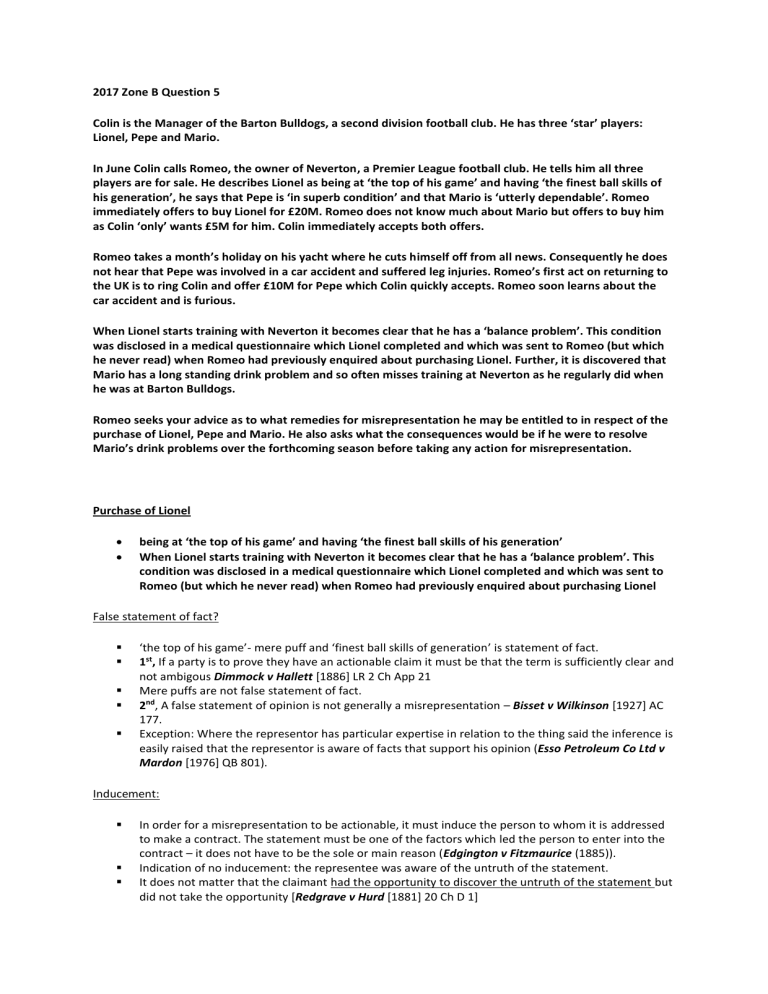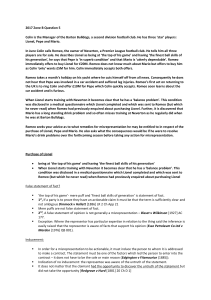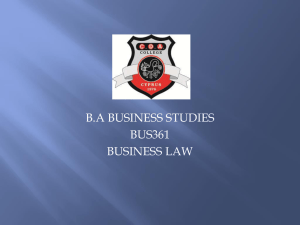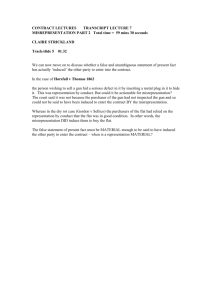Contract Law Misrepresentation Exam Question
advertisement

2017 Zone B Question 5 Colin is the Manager of the Barton Bulldogs, a second division football club. He has three ‘star’ players: Lionel, Pepe and Mario. In June Colin calls Romeo, the owner of Neverton, a Premier League football club. He tells him all three players are for sale. He describes Lionel as being at ‘the top of his game’ and having ‘the finest ball skills of his generation’, he says that Pepe is ‘in superb condition’ and that Mario is ‘utterly dependable’. Romeo immediately offers to buy Lionel for £20M. Romeo does not know much about Mario but offers to buy him as Colin ‘only’ wants £5M for him. Colin immediately accepts both offers. Romeo takes a month’s holiday on his yacht where he cuts himself off from all news. Consequently he does not hear that Pepe was involved in a car accident and suffered leg injuries. Romeo’s first act on returning to the UK is to ring Colin and offer £10M for Pepe which Colin quickly accepts. Romeo soon learns about the car accident and is furious. When Lionel starts training with Neverton it becomes clear that he has a ‘balance problem’. This condition was disclosed in a medical questionnaire which Lionel completed and which was sent to Romeo (but which he never read) when Romeo had previously enquired about purchasing Lionel. Further, it is discovered that Mario has a long standing drink problem and so often misses training at Neverton as he regularly did when he was at Barton Bulldogs. Romeo seeks your advice as to what remedies for misrepresentation he may be entitled to in respect of the purchase of Lionel, Pepe and Mario. He also asks what the consequences would be if he were to resolve Mario’s drink problems over the forthcoming season before taking any action for misrepresentation. Purchase of Lionel being at ‘the top of his game’ and having ‘the finest ball skills of his generation’ When Lionel starts training with Neverton it becomes clear that he has a ‘balance problem’. This condition was disclosed in a medical questionnaire which Lionel completed and which was sent to Romeo (but which he never read) when Romeo had previously enquired about purchasing Lionel False statement of fact? ‘the top of his game’- mere puff and ‘finest ball skills of generation’ is statement of fact. 1st, If a party is to prove they have an actionable claim it must be that the term is sufficiently clear and not ambigous Dimmock v Hallett [1886] LR 2 Ch App 21 Mere puffs are not false statement of fact. 2nd, A false statement of opinion is not generally a misrepresentation – Bisset v Wilkinson [1927] AC 177. Exception: Where the representor has particular expertise in relation to the thing said the inference is easily raised that the representor is aware of facts that support his opinion (Esso Petroleum Co Ltd v Mardon [1976] QB 801). Inducement: In order for a misrepresentation to be actionable, it must induce the person to whom it is addressed to make a contract. The statement must be one of the factors which led the person to enter into the contract – it does not have to be the sole or main reason (Edgington v Fitzmaurice (1885)). Indication of no inducement: the representee was aware of the untruth of the statement. It does not matter that the claimant had the opportunity to discover the untruth of the statement but did not take the opportunity [Redgrave v Hurd [1881] 20 Ch D 1] Types of misrepresentation: Fraudulent, s.2(1) MA or Innocent misreprentation. Purchase of Pepe ‘in superb condition’ In the meantime, Pepe was involved in a car accident and suffered leg injuries False statement of fact? With v O’Flanagan [1936] Ch 575 and Spice Girls Ltd [2000] EWCA Civ 15: When statements were true when made but, due to a change of circumstances, became untrue thereafter but before the relevant contract was signed, the statements are as a ‘continuing representation’ by virtue of which, when the change of circumstances occurred, the representor was at that moment treated as making an untrue statement of existing fact. A false statement of opinion is not generally a misrepresentation – Bisset v Wilkinson [1927] AC 177. Exception: Where the representor has particular expertise in relation to the thing said the inference is easily raised that the representor is aware of facts that support his opinion (Esso Petroleum Co Ltd v Mardon [1976] QB 801). Inducement: In order for a misrepresentation to be actionable, it must induce the person to whom it is addressed to make a contract. The statement must be one of the factors which led the person to enter into the contract – it does not have to be the sole or main reason (Edgington v Fitzmaurice (1885)). Indication of no inducement: The representee relied upon some other inducement (Attwood v Small [1838] 160 ER 633) Type of misrepresentation: Fraudulent or s.2(1) Purchase of Mario ‘utterly dependable’ Romeo does not know much about Mario but offers to buy him as Colin ‘only’ wants £5M for him it is discovered that Mario has a long standing drink problem and so often misses training at Neverton as he regularly did when he was at Barton Bulldogs. Romeo also asks what the consequences would be if he were to resolve Mario’s drink problems over the forthcoming season before taking any action for misrepresentation. False statement of fact A false statement of opinion is not generally a misrepresentation – Bisset v Wilkinson [1927] AC 177. Exception: Where the representor has particular expertise in relation to the thing said the inference is easily raised that the representor is aware of facts that support his opinion (Esso Petroleum Co Ltd v Mardon [1976] QB 801). Inducement: In order for a misrepresentation to be actionable, it must induce the person to whom it is addressed to make a contract. The statement must be one of the factors which led the person to enter into the contract – it does not have to be the sole or main reason (Edgington v Fitzmaurice (1885)). Types of misrepresentation: Fraudulent or s.2(1) MA Remedy: Rescission or Damages in tort of deceit. Type of misrepresentation same for all: Fraudulent or s.2(1) MA Derry v Peek [1889] 14 App Cas 337: Fraudulent: Misrepresentation is considered Fraudulent if false statement was made: Knowingly, or Without belief of it. Burden of proof on plaintiff and difficult to prove. s.2(1) MA: Under s.2(1) MA- A misrepresentee will be awarded damages as fraudulent misrepresntation if: One party made a misrepresentation Misrepresentator had no reasonable ground to believe it was true The other party relied on it and suffered loss Colin would be liable for damages unless he can prove the statement made (objective limb) and he indeed believed it when making the statement (subjective limb). Howard Marine [1978] QB 574 and more recently in Foster v Action Aviation Ltd [2013] EWHC 2439: Burden of proof on misrepresentator and difficult to discharge. Innocent misrepresntation under s.2(2) MA arises Arises when misrepresnator made the statement with honest belief of its truth. Negligent Misrepresentation Hedley Byrne v Heller [1964] AC 465: Requirement of a ‘special relationship‘ giving rise to a duty of care. Negligent Misrepresentation under common law if the misrepresentator had no reasonable ground to believe of it’s truth. There needs presence of a special relationship- represnator must have some special skill or knowledge and He knew or resonable for him to assume that it will be relied upon. Burden of proof on the claimant. Remedies: Rescission easily applicable to all but Mario (due to delay and affirmation) Special case of Mario: Bar to rescission Bar 1: Where there is a significant lapse of time between the making of the contract and the discovery of the misrepresentation In Leaf v International Galleries [1950] 2 KB 86, for example, the gap was five years. Salt v Stratstone Specialist Ltd [2015] EWCA Civ 745: Mr Justice Roth commented that a lapse of time will only operate as a bar to rescission in circumstances where the lapse of time is reasonable such that it would be inequitable in all the circumstances to grant rescission. Determination of what is reasonable will require close attention to the facts of the case. Bar 2: Where a party affirms the misrepresentation: Where a party to the contract, aware of the other party’s misrepresentation, continues with the contract, and thus ‘affirms’ it. Affirmation occurs when the ‘dual knowledge’ test is satisfied (Peyman v Lanjani [1985] Ch 475). It is necessary that at the time of the conduct said to constitute affirmation the representee must be aware of both the circumstance that gives rise to the right to rescind and also to the fact that that right has arisen. Damages in Tort of Deceit: Doyle v Olby [1969] 2 QB 158: All losses which are directly attributable to the deceit are recoverable. Damages for misrepresentation under s.2(1) of the 1967 Act: Royscot Trust Ltd v Rogerson [1991] 2 QB 297: Damages under s.2(1) should be calculated in the same way as if the statement had been made fraudulently. This means, therefore, that all losses are recoverable, not simply those that were reasonably foreseeable (as would be the case with an action for negligent mis-statement under the Hedley Byrne principle). This conclusion was based on the court’s view of the proper interpretation of s.2(1) and the fact that it appears to require the negligent misrepresentor to be treated in the same way as the fraudulent one. Overall, the damages available under s.2(1) are the same as those available in the tort of deceit. False statement of fact? Inducement? Types of misrepresentation. Remedies.


